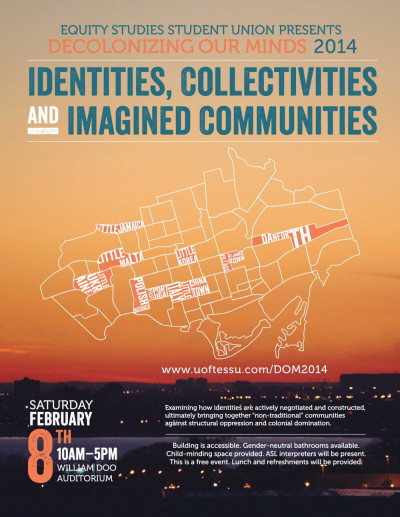Decolonizing Our Minds 2014: Identities, Collectivities & Imagined Communities
Saturday, February 8, 2014

The University Of Toronto Equity Studies Student Union Presents: Decolonizing Our Minds 2014: Identities, Collectivities & Imagined Communities
Over the past six years, the Equity Studies Students’ Union has annually hosted the Decolonizing Our Minds conference so as to identify and interrogate the ways in which different groups of people practice resistance. This year we examine how identities are actively negotiated and constructed, ultimately bringing together “non-traditional” communities against colonial domination and structural oppression.
Although colonialism and neocolonialism have led to the imposition of particular identity markers, individuals have been increasingly re-appropriating the processes of identity formation to create their own sense of “self.” Identities are thus constantly in flux, contested relationally and contextually. We seek to understand the attempts to define one’s own identity as a means to disrupting hegemonic discourses and dominant paradigms. We then look at how similar narratives and personal histories generate collective identities and espouse solidarities. Finally, we analyze collective identities as the foundation for communities of resistance.
- Lunch and refreshments will be provided - Halal and vegetarian options will be available.
- Help us reduce our waste. We encourage everyone to bring their own Tupperware.
- For any accessibility concerns or questions please email uoft.essu@gmail.com.
- Building is accessible. Gender-neutral washrooms are available. ASL interpreting will be provided. Child-minding will be provided.
THIS IS A FREE EVENT. ALL ARE WELCOME.



